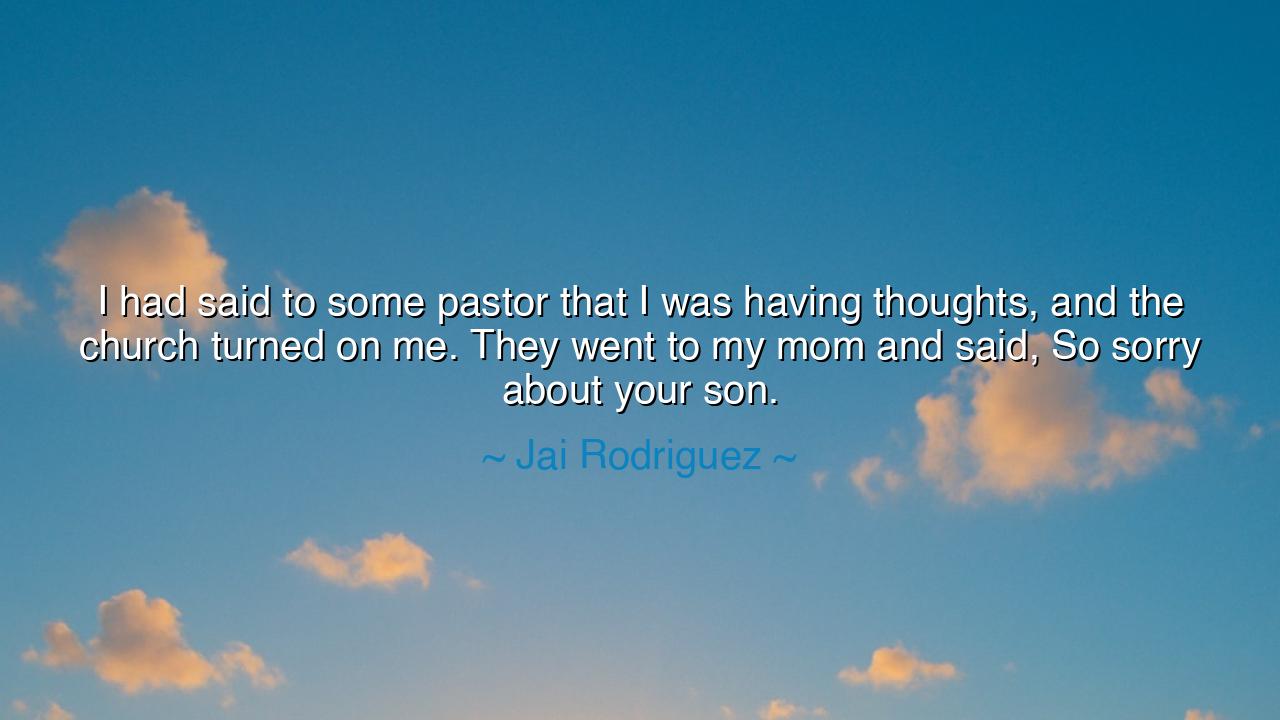
I had said to some pastor that I was having thoughts, and the
I had said to some pastor that I was having thoughts, and the church turned on me. They went to my mom and said, So sorry about your son.






Hear, O seekers of truth, the sorrowful yet courageous words of Jai Rodriguez, who declared: “I had said to some pastor that I was having thoughts, and the church turned on me. They went to my mom and said, ‘So sorry about your son.’” These words carry the sting of rejection, the pain of being cast out by the very place that should have been a refuge. Yet they also reveal a universal truth: that institutions built for mercy can sometimes become instruments of judgment, and that the courage to speak one’s truth may invite not comfort, but condemnation.
First, let us consider the act itself: the confession of thoughts. To share one’s doubts, struggles, or desires with a spiritual guide is an act of vulnerability, a reaching outward for guidance. It is the cry of the human soul longing for understanding. In Rodriguez’s words, we hear not rebellion, but honesty—the willingness to lay bare the inner self in hopes of being received with compassion. Yet instead of compassion, he was met with betrayal.
Next, the reaction of the church: it “turned on” him. What should have been sanctuary became exile. The people of God, who proclaim grace and forgiveness, instead became accusers, choosing shame over empathy. And worse, they carried their judgment not only to him but to his mother, offering hollow condolences for a son who was very much alive. This action reveals the cruelty of stigma: when a community values its rules more than its people, it wounds not only the soul but also the bonds of family.
History echoes with such stories. Recall Galileo Galilei, who dared to confess his “thoughts” that the earth revolved around the sun. To him, these were observations of truth; to the church of his time, they were dangerous heresies. He was denounced, silenced, and punished, though history would later vindicate him. Like Rodriguez, Galileo learned that to speak openly in the wrong place could turn allies into enemies. Both stories remind us that truth is often met first with rejection before it is met with acceptance.
The meaning of Rodriguez’s words is thus not confined to his own life. They speak to all who have felt alienated by the very communities that promised to embrace them. His experience is a mirror of the universal human struggle between authenticity and conformity. To reveal oneself is risky, but to hide is death to the soul. Rodriguez chose truth, and though it brought sorrow, it also became the soil from which his resilience grew.
The lesson is clear: institutions, even sacred ones, are made of humans, and humans are flawed. Do not measure your worth by their judgment. Instead, seek communities that embody compassion, that honor honesty, and that embrace difference as part of the divine design. If you find yourself rejected, remember that rejection says more about the fear of others than about the truth within you.
So, dear listener, take this counsel: when others come to you with their “thoughts,” whether doubts, confessions, or struggles, do not turn them away. Do not heap shame upon them, but listen with kindness, for in that moment you may be their only refuge. And if you yourself are met with rejection, know that your value is not lessened. Walk forward with courage, honor the truth of your soul, and surround yourself with those who see you not as a sorrow, but as a gift. For in this way, you will rise above judgment and walk in the freedom of authenticity, carrying light where once there was only shadow.






AAdministratorAdministrator
Welcome, honored guests. Please leave a comment, we will respond soon